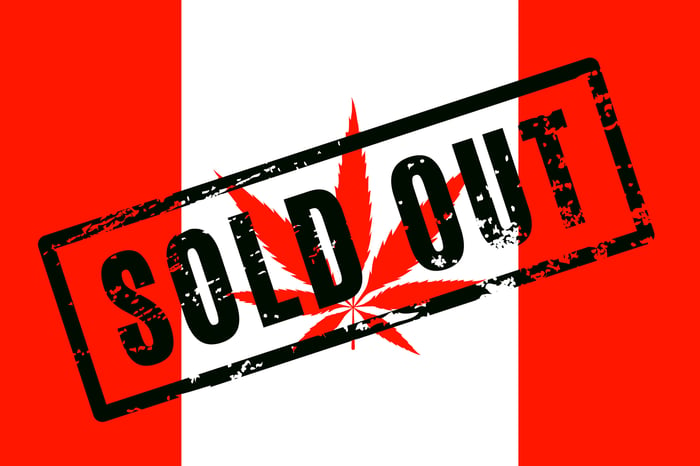Attention, cannabis stock investors: The big day you've been waiting for in 2019 has finally arrived.
One year ago, on Oct. 17, 2018, Canada lifted the curtain on nine decades of recreational cannabis prohibition and allowed for the legal sales of adult-use marijuana. Today, on Oct. 17, 2019, our neighbor to the north will move forward with the next phase of the marijuana legalization process, affably known as "legalization 2.0." Namely, the regulations concerning derivative pot products will officially take effect. Derivatives include nondried flower products, such as edibles, cannabis-infused beverages, vapes, concentrates, and topicals.

Image source: Getty Images.
When the Cannabis Act was passed, only dried flower, cannabis oil, and sublingual sprays were initially given a green light. This was done to both expedite the Cannabis Act's approval in Parliament, as well as give regulators and provinces time to adjust to a legal environment. With that year having passed, a new green flag waves today.
But there are some important things about this derivative legalization that you need to know if you're an investor in the cannabis space.
1. This is actually a delayed product launch
First of all, the legalization of derivatives isn't exactly the same as the launch of alternative consumption products. Although the regulations governing derivatives do go into effect today, Health Canada has been clear that it's going to take a good two months before sufficient inventory is built up for these products to appear in licensed dispensaries. That means mid-December is when the first sales of derivative products will begin.
At this time last year, the expectation had been that derivative products would be on dispensary shelves by no later than the one-year anniversary of the legalization of adult-use cannabis. But Health Canada extended that timeline a few months ago, disappointing both Canadian pot stocks and their investors.
2. Not everything is legal
Investors would be wise to keep in mind that not everything is legal, despite these new regulations.
One notable product that will remain illicit is alcohol-based infused beverages. That's notable considering that we've seen two major alcohol companies, Constellation Brands (STZ 0.78%) and Molson Coors Brewing (TAP 0.56%), invest in or partner with cannabis companies to create a line of infused beverages. For now, Constellation and Molson Coors will have to focus their attention entirely on nonalcoholic beverages.

Image source: Getty Images.
3. Derivatives are the wave of the future
In the grand scheme of things, derivatives should be considered the wave of the future for the pot industry. According to a research report issued earlier this year by Cowen Group, half of all marijuana sales in a mature U.S. market are expected to come from derivative products, and it's pretty safe to infer that similar percentages will likely be seen in Canada.
Furthermore, surveys have shown that younger adults are more likely to consume derivatives, rather than smoke dried cannabis flower. These younger adults are the future of the high-growth cannabis industry.
4. The margins are considerably better than dried flower
Arguably the most exciting aspect of the derivatives rollout is what it could do for the margins of marijuana stocks. You see, derivatives have few oversupply or pricing concerns for the time being, which means they're liable to deliver substantially higher margins than dried cannabis flower. That's why every single cannabis stock has devoted some portion of their product portfolio to derivatives.
New Brunswick-based OrganiGram Holdings (OGI 1.07%), for instance, spent 15 million Canadian dollars on a line of fully automated equipment to produce up to 4 million kilos of infused chocolates per year. OrganiGram also developed a proprietary nano-emulsification technology that can be added to beverages and allows for the onset of the effect of cannabinoids to occur faster. This technology will first be introduced as a powder. OrganiGram was also one of four companies chosen by PAX Labs to be a concentrate supplier for the Era vape device.

Image source: Getty Images.
5. Supply issues are expected to wreak havoc for many quarters to come
Conversely, the least exciting aspect of marijuana legalization 2.0 is that it's bound to face the same supply issues that have wreaked havoc on the dried flower space over the past year.
Regulatory agency Health Canada entered the year with more than 800 cultivation and sales license applications on its desk for review. Even with midyear changes to the cultivation license application process, it's going to take a while to work through this enormous backlog. To boot, select provinces have been slow to license physical dispensaries. Both of these factors have worked to keep legal cannabis off the market.
When derivatives finally do hit dispensary shelves in two months, it's almost assured that these same supply issues will be present. It could be numerous quarters before cannabis stocks really witness a surge in sales from derivatives.
6. It promises to be a fiercely competitive space
Lastly, marijuana stock investors should realize that while derivatives are the cannabis industry's moneymaker, it'll also be a space that's fiercely competitive.
For instance, Constellation Brands and Molson Coors were early movers in the infused beverage space. Constellation made a $4 billion equity investment in Canopy Growth, the largest pot stock in the world, while Molson Coors formed a joint venture with HEXO. The problem is there'll likely be a lot of infused beverage entrants in Canada, and there's little guarantee that ancillary players like Constellation or Molson Coors will see their sales needles move much, if at all, in the intermediate-term, especially with supply issues rearing their head.
In short, today is indeed a marijuana milestone for Canada. But just like last year's legalization day, it'll require some maturation of the cannabis industry before tangible results are seen by investors.





